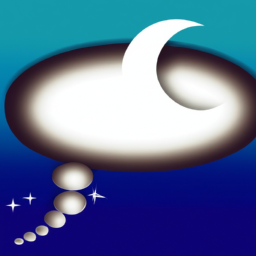Have you ever wanted to have a sensual dream? A dream that makes you wake up feeling thrilled and satisfied? If you have, you’re not alone. Many people crave these types of dreams but aren’t sure how to make them happen. That’s where I can help – by offering you advice on how to achieve those passionate dreams you’ve been desiring.
Dreams have fascinated humans for centuries. They are a mysterious and complex phenomenon that occurs during our sleep. Scientists have spent years trying to understand the science behind dreams, and some studies suggest that they can be influenced by our thoughts and actions.
So, if you want to have a sexy dream, there are a few things you can do to increase your chances. In this article, I’ll share some tips and techniques that can help you have a more sensual and fulfilling dream experience.
Key Takeaways
- Keeping a dream journal and practicing visualization can improve the clarity and vividness of dreams, potentially leading to more sensual experiences in dreams.
- Creating a relaxing sleep environment with aromatherapy, such as using lavender oil, can promote relaxation and increase the likelihood of having sensual dreams.
- Engaging in sensual activities like dancing or cooking together can add more sensuality to daily routine and potentially lead to more sensual dreams.
- Avoiding stimulants like caffeine, nicotine, and alcohol before bedtime, and consuming foods high in tryptophan and complex carbohydrates, can help promote relaxation and increase the likelihood of having sexy dreams.
Understanding the Science behind Dreams
Dreams are often a mysterious and fascinating phenomenon, but understanding the science behind them can help us better comprehend their significance and potential impact on our lives.
When we sleep, our brains go through several stages of sleep, including the REM sleep stages, where dreams occur. During these stages, our bodies are paralyzed, and our brain activity resembles that of being awake. It’s believed that the brain uses this time to process emotions and memories, which can manifest in our dreams.
Dream symbolism is another aspect of understanding the science behind dreams. Dreams are often symbolic, and the same symbol can mean different things to different people. For example, dreaming of water can represent emotions, creativity, or even cleansing, depending on the dreamer’s personal experiences and associations.
Understanding dream symbolism can help us interpret our dreams and gain insight into our subconscious thoughts and emotions.
Keeping a dream journal is a great way to start exploring the science behind dreams. By recording our dreams, we can track patterns, symbols, and emotions that arise. We can also reflect on our dreams and try to interpret their meaning.
Keeping a dream journal can help us remember our dreams more vividly, making it easier to analyze them. Understanding the science behind dreams can help us have more meaningful and memorable dreams, leading to a deeper understanding of ourselves and our subconscious thoughts and emotions.
Keep a Dream Journal
By documenting your subconscious thoughts and emotions in a journal, you could potentially unlock a new level of intimacy within your own mind. Dream journaling is a practice that can help you understand your dreams and ultimately lead to more vivid and memorable ones.
The benefits of dream journaling are numerous, including gaining insight into your innermost thoughts and feelings, recognizing patterns in your dreams, and improving your overall mental health.
Maintaining a dream journal is easy and can be done in just a few simple steps. First, keep your journal and pen beside your bed, so you can record your dreams as soon as you wake up. Next, write down as much detail as possible about your dream, including any emotions, colors, and sensations you experienced. Finally, try to interpret the meaning of your dream by analyzing the symbols and themes that emerged.
To make the most out of your dream journal, here are a few tips to keep in mind. First, be consistent and write in it every day, even if you don’t remember much about your dream. Second, be honest and don’t censor yourself, as this can hinder your understanding of your subconscious thoughts. Finally, review your dream journal periodically to identify any recurring themes or patterns.
By doing so, you can gain a deeper understanding of your psyche and potentially unlock the power of lucid dreaming.
Dream journaling is just one step towards achieving the ultimate goal of having sexy dreams. In the next section, we’ll explore the practice of lucid dreaming and how it can help you take control of your subconscious mind.
Practice Lucid Dreaming
To take control of your subconscious mind, you need to practice lucid dreaming. It’s a state where you become aware that you’re in a dream and can control the outcome, like a superhero in a movie. It takes mental preparation and some reality checks to achieve this.
Mental preparation involves setting the intention to have a lucid dream before going to bed. You can also use affirmations or visualization techniques to aid in achieving this state.
Reality checks are little tests you do throughout the day to determine whether or not you’re awake. For example, try reading a sentence twice to see if the words change or try pinching yourself to see if you feel pain.
Lucid dreaming can be a powerful tool for exploring your subconscious mind and for having more exciting dreams. Once you’ve mastered the art of lucid dreaming, you can use it to confront your fears, try out new experiences, and even solve problems.
With practice and dedication, anyone can learn to lucid dream. Next, we’ll discuss visualization techniques to help you enhance your dream experience.
Visualization Techniques
Get ready to enhance your dream experience with visualization techniques! Visualization is a powerful tool that can help you improve your ability to dream and increase the clarity of your dreams.
By visualizing specific images and scenarios before you go to sleep, you can train your brain to create these experiences in your dreams. Here are three tips to help you get started:
- Create a mental image: Before you go to sleep, close your eyes and imagine a scene that you would like to experience in your dreams. It could be anything from lying on a beach to flying over the city. Focus on the details of the scene and try to imagine yourself in the middle of it.
- Use affirmations: Use positive affirmations to help you visualize your dream scenario. For example, if you want to dream about being on a beach, repeat the phrase “I’m on a beautiful beach”several times before you go to sleep. This will help reinforce the image in your mind and increase the likelihood of it appearing in your dreams.
- Overcome common obstacles: One of the biggest obstacles to visualization is a wandering mind. If you find that your mind keeps wandering, try to refocus on your dream scenario by repeating your affirmation or by creating a mental image of your ideal dream scene.
Visualization benefits are many and can help you improve your dream experience. By practicing visualization techniques, you can increase the clarity of your dreams, remember them better, and even become more lucid during your dreams. However, it’s important to remember that visualization is not a quick fix and requires consistent practice.
To create a relaxing sleep environment, it’s important to focus on creating a space that’s conducive to sleep. This could include things like keeping your bedroom cool and dark, avoiding screens before bed, and using relaxation techniques like meditation or deep breathing.
By creating a relaxing sleep environment, you can help to improve the quality of your sleep and increase your chances of having more vivid and memorable dreams.
Create a Relaxing Sleep Environment
Transform your bedroom into a peaceful oasis by incorporating calming symbols like nature-inspired decor or soft lighting to create an environment conducive to restful sleep. Soft lighting is a great way to create a relaxing atmosphere, especially in the evening. By using lamps with dimmer switches or string lights, you can adjust the lighting to your preference and reduce harsh overhead lighting that can cause eye strain and disrupt your sleep.
Additionally, comfortable bedding is essential to a good night’s sleep. Invest in high-quality sheets, pillows, and blankets that feel cozy and comfortable against your skin. Calming music and meditation can also help you relax and prepare for a peaceful night’s sleep. Listening to calming music or a guided meditation before bedtime can help quiet your mind and reduce stress. You can find many free meditation apps or YouTube channels that offer guided meditations specifically designed to help you fall asleep.
Plus, if you have trouble falling asleep, try incorporating breathing exercises into your bedtime routine. Slow, deep breathing can help you relax and drift off to sleep. Consider using aromatherapy to create a relaxing atmosphere in your bedroom. Essential oils like lavender, chamomile, and jasmine are known for their calming properties and can help you relax and reduce stress. You can use a diffuser or spray the oils on your bedding or pillow before bedtime.
By creating a calming sleep environment, you can improve the quality of your sleep and increase your chances of having sexy dreams.
Use Aromatherapy
You can enhance your sleep experience by incorporating aromatherapy into your bedtime routine. Aromatherapy is the practice of using essential oils to promote relaxation and improve overall well-being. The benefits of aromatherapy are numerous, ranging from reducing stress and anxiety to improving the quality of sleep.
Choosing the right essential oils is key to achieving the desired results. Lavender oil is a popular choice for its calming properties, while bergamot oil is known for its mood-boosting effects. Other essential oils that can promote relaxation include chamomile, ylang-ylang, and sandalwood. Be sure to choose high-quality oils and use them properly, either by diffusing them in a room or by applying them topically.
Incorporating aromatherapy into your bedtime routine can be a simple and effective way to improve your sleep and overall well-being. As you continue to create a relaxing sleep environment, consider adding essential oils to your routine. This will help set the stage for the next step in achieving sexy dreams: incorporating sensual activities into your day.
Incorporate Sensual Activities into Your Day
To add more sensuality to your daily routine, try incorporating activities like dancing or cooking together with your partner. Mindful sensuality is all about being present in the moment and fully engaged with your senses. By setting aside time for daily rituals that involve creative expression and sensual exploration, you can cultivate a deeper connection to your body and your partner.
Here are three ways to incorporate sensual activities into your daily routine:
- Take a dance class together: Dancing is a great way to connect with your partner and express yourself physically. Whether you prefer salsa, ballroom, or hip hop, taking a dance class together can be a fun and sensual way to explore your bodies and bond with each other.
- Cook a meal together: Cooking can be a sensual experience, with its mix of aromas, textures, and tastes. By cooking a meal together with your partner, you can explore each other’s senses and create something delicious to share.
- Take a bath or shower together: Bathing or showering together can be a sensual way to relax and connect with your partner. Try lighting candles, playing music, or using scented oils to create a romantic atmosphere.
By incorporating these types of activities into your daily routine, you can cultivate a deeper sense of intimacy and connection with your partner. However, it’s important to avoid stimulants before bedtime to ensure a good night’s sleep.
Avoid Stimulants before Bedtime
If you want to have sexy dreams, it’s important to create the right environment for restful sleep. One of the key factors in achieving this goal is to avoid stimulants before bedtime. This includes substances like caffeine, nicotine, and alcohol, which can all interfere with your body’s natural sleep cycle.
Research shows that the effects of caffeine can last for up to six hours, which means that drinking coffee or tea late in the day can have a significant impact on your ability to fall asleep. Similarly, the nicotine in cigarettes can stimulate your nervous system and make it harder to wind down at night. And while alcohol may initially make you feel drowsy, it can also disrupt your sleep later in the night, leading to less restful and restorative sleep overall.
If you’re looking for healthy alternatives to these substances, try herbal teas that promote relaxation, like chamomile or valerian root. Timing considerations are also important when it comes to eating and drinking before bed. It’s best to avoid heavy meals or large amounts of fluids close to bedtime, as these can also interfere with your sleep. Instead, opt for light snacks or small meals, and drink plenty of water throughout the day to stay hydrated.
By making these simple changes to your routine, you can create a more conducive environment for restful sleep and increase your chances of having sexy dreams. And if you’re looking for more tips on how to improve your sleep quality, stay tuned for our next section on trying sleep-inducing foods.
Try Sleep Inducing Foods
Now that we know the importance of avoiding stimulants before bedtime, let’s explore something that can help us drift into a peaceful slumber. Have you ever heard of sleep-inducing foods? Yes, they exist, and they can help us relax and fall asleep faster.
First, let’s talk about the foods to avoid before bedtime. Anything that’s high in sugar or caffeine should be avoided, as they can keep us awake and alert. Also, spicy foods can cause indigestion and heartburn, which can make it difficult to fall asleep. It’s best to avoid heavy meals as well, as they can make us feel bloated and uncomfortable.
Now, let’s move on to the foods to eat before bedtime. Foods high in tryptophan, like turkey and chicken, can increase the production of serotonin, which can help us relax and feel sleepy. Nuts, such as almonds and walnuts, are also great sources of tryptophan. Additionally, complex carbohydrates, like oatmeal and whole-grain bread, can increase the production of insulin, which can help us feel drowsy.
By incorporating these sleep-inducing foods into our diet, we can improve the quality of our sleep, and even have more vivid and sexy dreams. But remember, patience and persistence are key. It may take some time for our bodies to adjust to these changes, but with consistency, we can reap the benefits of a good night’s sleep.
Be Patient and Persistent
Remember, being patient and persistent is key in improving the quality of your sleep. If you want to have sexy dreams, you need to make sure that you’re getting enough sleep.
One way to do this is through meditation techniques. Meditation can help you calm your mind and relax your body, which can lead to better sleep and more vivid dreams. There are many different types of meditation, so it’s important to find what works best for you.
Another way to improve the quality of your sleep is through creative visualization tips. Visualization is a powerful tool that can help you focus your mind and create a positive mental state. By visualizing yourself having sexy dreams, you can program your subconscious to work towards achieving that goal. You can also try visualizing yourself in a relaxing environment, such as a beach or a forest, which can help you fall asleep faster and have more restful sleep.
Remember that improving the quality of your sleep takes time and effort. You won’t see results overnight, but if you’re persistent and consistent in your efforts, you’ll eventually start to see improvements. Try incorporating these techniques into your daily routine, and don’t get discouraged if you don’t see immediate results.
With time, patience, and persistence, you can improve the quality of your sleep and start having more sexy dreams.
Frequently Asked Questions
Can certain medications affect the frequency or intensity of sexy dreams?
I’ve noticed that certain medications can affect the frequency and intensity of my dreams, including sexy ones. It’s important to keep a dream journal to track any changes and discuss them with a healthcare provider.
Are there any specific foods or supplements that can enhance sexy dream experiences?
Can aphrodisiacs enhance lucid dreaming? While there’s no scientific evidence to support this claim, some people believe that consuming certain foods like oysters, chocolate, or ginseng can increase sexual desire and potentially lead to more vivid sexual dreams.
Can stress or anxiety impact the likelihood of having sexy dreams?
Yes, stress and anxiety can impact the likelihood of having sexy dreams. Relaxation techniques such as deep breathing and meditation can help reduce stress levels. Creating a comfortable sleep environment can also aid in promoting relaxation and improving dream recall.
How can I differentiate between a sexy dream and a sexual nightmare?
To differentiate between a sexy dream and a sexual nightmare, I focus on the emotions I feel upon waking up. Causes of sexual nightmares may include trauma or anxiety. To control dream content, try lucid dreaming or relaxation techniques.
Is it possible for someone to have too many sexy dreams?
I once had a month-long streak of sexy dreams, which left me feeling exhausted and drained. Dream interpretation revealed my subconscious was seeking more excitement in my waking life. Lucid dreaming techniques helped me control and reduce these dreams.
Conclusion
In conclusion, having sexy dreams isn’t just a fantasy, but a possibility that can be achieved with the right techniques and mindset.
By understanding the science behind dreams, keeping a dream journal, practicing lucid dreaming, and incorporating sensual activities into your day, you can increase your chances of having sexy dreams.
Visualization techniques, creating a relaxing sleep environment, avoiding stimulants before bedtime, and trying sleep-inducing foods can also aid in achieving this goal.
Remember, having sexy dreams is a personal and natural experience that should be approached with patience and persistence. It’s important to not get discouraged if you don’t see immediate results, as everyone’s journey is unique.
With time and dedication, you can tap into the power of your subconscious mind and unleash your deepest desires. So go ahead, give it a try, and see where your dreams take you.
Sweet dreams!










